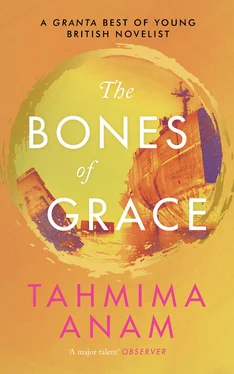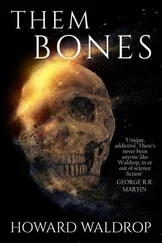Abul Hussain came to collect me the next morning, but at the airport, there were no flights to Chittagong. ‘Sorry, ma’am, due to bad weather all flights are indefinitely postponed,’ the girl behind the counter said, wearing a surprisingly tight red-and-grey suit.
‘When is the next flight?’
‘Scheduled for tomorrow morning, ma’am, but that also may not depart.’
I thought about going home, but now that I had set my mind on returning to Sithakunda, I couldn’t turn back. I ducked into the car. ‘Abul Hussain, can you drive us to Chittagong?’ It was a five-or six-hour drive; Dolly and Bulbul had done it regularly in their jeep before the domestic terminal was refurbished.
Abul Hussain glanced at me in the rearview mirror. ‘We would have to tell sir.’
‘Baba won’t mind, I’ll call him now.’
‘There isn’t enough petrol.’
I rifled through my bag, failing to find any money. ‘Stop at a bank, I’ll get some cash.’
We drove through the city again, going south from Mohakhali to Mohammadpur. Abul Hussain parked in front of a shopping mall, where a uniformed guard opened the door to a tiny air-conditioned cubicle that housed an ATM machine. I had always found it strange that in America the cash machines were exposed, as if there was nothing remarkable about being able to take money out of a cavity in the wall. At the shop next door, I bought a packet of Uncle Chipps and a few bottles of water. Then I remembered I hadn’t really eaten anything since the night before, which felt like a lifetime ago now, so I hunted through the mall for a restaurant, finally settling on a place that sold fried chicken. I bought a box for myself and one for Abul Hussain.
In the car, I sent a text message to Abboo. Ok if Abul Hussain drives me to Chittagong? Urgent business . Then I gave Abul Hussain a hefty tip and passed him the fried chicken. ‘You can stay the night and drive back tomorrow.’
He selected a piece of chicken from the carton, taking a bite and then placing it on his knee, where it remained as he negotiated the traffic. In Mohammadpur he picked it up again and took another bite, leaving an oily stain on the leg of his trouser. I offered him a napkin, guilty for making him drive all the way.
After Mohammadpur the traffic cleared and the dense tangle of the city gave way to low-slung buildings and carts piled high with vegetables, and then, acres and acres of brickyards, everything red, dotted with tall, narrow furnaces that churned smoke into the sky. Eventually, the view turned to farmland, chequerboard patches of land planted with rice as far as the eye could see, everything flat and green to the horizon. I closed my eyes, willing sleep to come and cut out the hours until I arrived at the beach, to Mo and Gabriela and Grace .
My phone rang, but I ignored it, knowing it would be my parents or Rashid. I recalled now that Ammoo had slapped me once, when I was eleven, for stealing her make-up bag and wearing lipstick to school. The principal had telephoned, and after a wordless ride home Ammoo had hit me softly across the cheek with a bewildered look, as though her arm had acted of its own accord. When I finally locked myself in my room and Ammoo had called out repeatedly. When I finally opened the door I found her curled up on the sofa. She hadn’t seemed sorry as much as surprised. The phone kept ringing. Eventually I decided to answer. It was Abboo.
‘Your mother is very upset. Dolly also called a few times. And there’s a storm coming.’
‘I know, that’s why I’m driving.’
‘They’re saying it’s going to be bad.’
‘Please, let me go. I know you did what you thought was best. But I can’t rest. I can’t work, I can’t do anything. I can’t be at peace.’
‘You were just a baby, a few weeks. A tiny thing in my hands. The most beautiful thing I had ever seen.’
I hung up so he wouldn’t hear me cry. Last night, when I couldn’t sleep, I had written an email to Rashid. It was full of regret for all the things I had allowed myself to do, that there was no excuse for the way I had behaved, but that, perhaps, if he tried very hard, he would see that there would have been no way for us to go ahead if I hadn’t at least made an attempt to piece together my past. I had gone over it again and again, but I had been unsure how to finish the message, whether I could tell him now that it was all over and we could begin again, but as a pale baby bird of a sun crested the horizon, I had decided not to send it.
I closed my eyes for a moment, and when I opened them the wipers were on and I could hear the sound of water above and below, rain on the car’s roof and on the road. I checked the time and it was only noon, but the rain clouds had smothered the light. We drove on, slowed by the darkness and the dense sheets of water. Abul Hussain switched on his headlights and bent over the wheel, holding on with both hands.
I called the Shipsafe office but no one answered. I asked Abul Hussain to turn on the radio, and the reception drifted in and out. I rifled through the magazines my father had left in the car and found a recent copy of Outlook India . There was news about Bollywood, a corruption scandal in the Indian Army, a recipe for Urad Dal. For a stretch of the highway, the sky cleared momentarily and the rain thinned, and I could make out the trees on either side of the road, the landscape changing from flat to gently rolling. Abul Hussain pointed to a sign. ‘Apa, can we stop for tea?’
He parked in front of a squat concrete building. I waited in the car while he ordered tea from a young boy sitting in front of a large kettle on a propane stove. When the tea was ready he passed me a small clay cup through the window. After a few minutes the sky thickened and it began to rain in earnest, and after Abul Hussain retrieved my cup, we set off again, seeing very little in front of us except the road ahead and the grey outlines of the hills in the distance.
The shops along the highway to Sithakunda were all closed. The car stalled, water sloshing around the tyres. Abul Hussain switched off the engine, then revved it again, propelling us forward, and we covered the last few miles at a crawl, the sound of the wipers beating back and forth. An hour or so later we reached the Shipsafe office.
The front door was locked. I borrowed a key from the caretaker, who informed me that everyone had gone home early because of the storm. I concentrated very hard on remaining downstairs instead of rushing up to the apartment and crawling on my hands and knees in search of a last fragment of you. Even down here at the office, I felt your presence, your footsteps burdening the air above me.
I switched on the overhead light. There was my desk, the glass chipped and taped together, the ancient computer, the corkboard with edge-curled newspaper clippings, Bilal’s battered armchair with the striped towel draped across the back, the smell of tea and biscuits. I had only been away a few months, but I realised I had left long before that, that the moment you arrived I hadn’t cared much for any of it. I remembered the feeling of being around you, which is that you swallowed all the air in the room, though perhaps it wasn’t you at all, but the strength of my feeling for you. In any case, I had been a poor volunteer; I had not done well by the pulling crew. And Mo I had let down altogether.
I glanced over the transcripts of the interviews. Without sentiment, I began to read. The words were flat on the page, one sad story following another, each starting with its same moment of fracture — an illness, a bad crop, the death of a father — and the long journey south, the bag of things they carried, the tiny pocket of hope, and then arriving at the shipyard and finding the acres of steel and rust, and Mr Ali, the dormitory, the long dark nights, carrying iron on their shoulders to the sound of chanting. I felt nothing, no sorrow, no jolt of recognition as the words I had heard and recorded appeared in black and white.
Читать дальше












